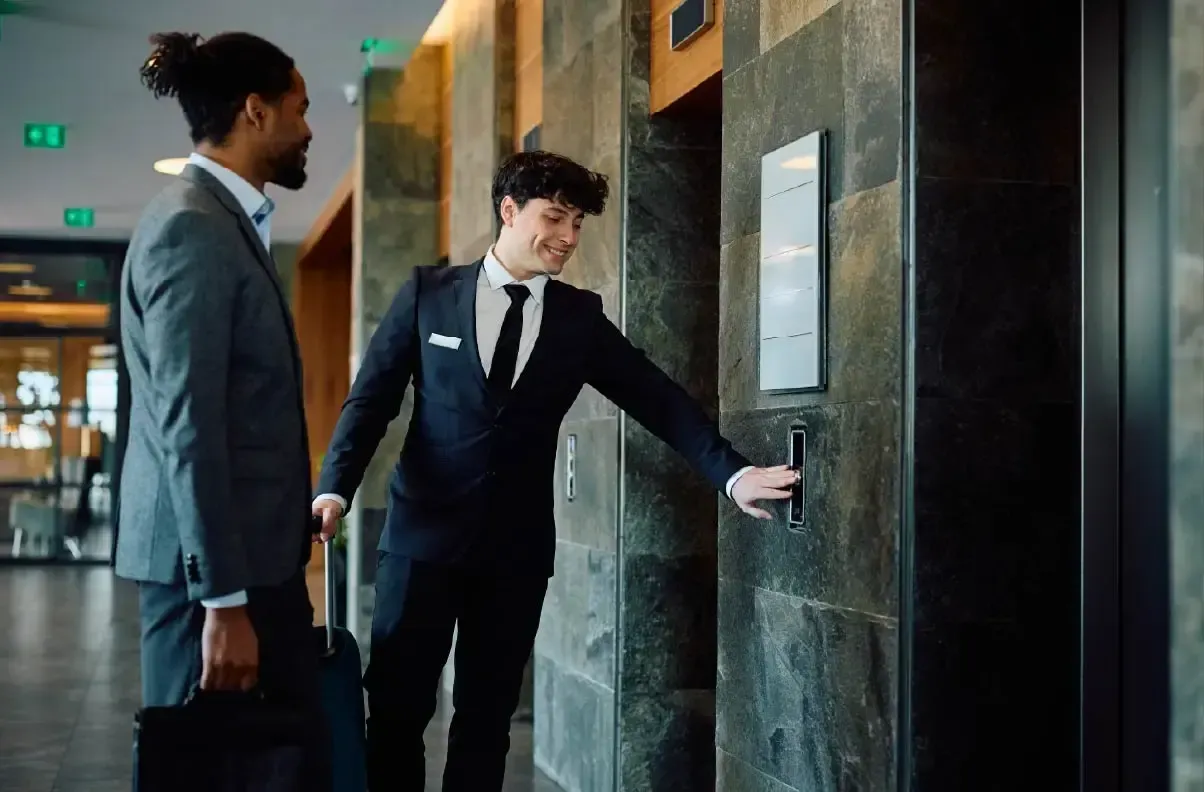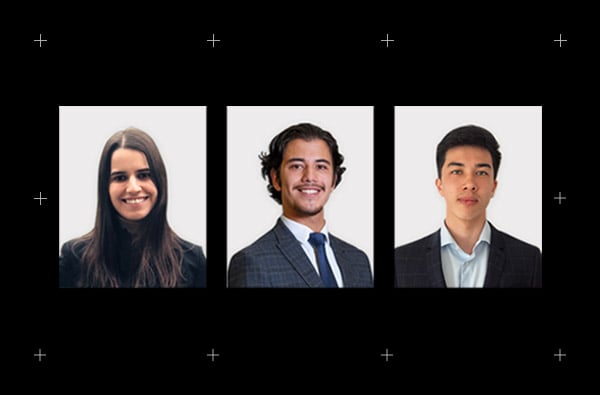Hospitality stands on the cusp of change. Even before the events of the last few months, our industry was finally beginning to embrace technology en mass and haul itself into the modern era; COVID-19 has accelerated this evolution and forced us to adapt more quickly than ever before.
One of the best ways to remain at the forefront of the industry is to listen to fresh perspectives, so we spoke to some of the brightest students from the prestigious Ecole Hoteliere de Lausanne, all of whom have just graduated with degrees in International Hospitality Management.
This next generation of hoteliers had plenty to say, covering topics about how the pandemic has fundamentally changed hospitality, the innovations they’d most like to see, and much more.
We spoke to:
- Sara Arzan
- Askar Bazarov
- Quentin Bouteiller
- Jade Chang
- Alexander Demishin
- Laura Hernandez
Have your hospitality goals changed in the last few months, given the widespread upheaval across the industry?
Laura: Due to the COVID situation, I believed it was not the best moment to apply for jobs in the hospitality industry. Therefore, I decided to continue my studies by taking a master's in Luxury Brand Management with a specialization in Hospitality and Events. This will allow me to become more specialized in this field and be more prepared when applying for jobs – my dream in the long term has always been to open a luxury boutique hotel back home in Gran Canaria.
Alexander: I haven't changed my goals too drastically, but the biggest issue right now seems to be the slowdown of the sector. I might have to rethink my interest in hotel development as I believe it will take one of the biggest hits. Operations, on the other hand, might be more interesting to look at now since there will definitely be a change in how hotels operate. Being part of that change could be exciting.
Jade: I’ve decided to do another year of studying by completing a postgraduate degree. Whilst I am hoping to continue within the luxury hospitality segment, the pandemic has made me consider which alternative choices could also be beneficial for furthering my career.
Askar: My goal was to enter a position in the industry where I’d be able to drive business development and innovation. I believe that this traditional industry has space for disruption, and I'd like to help shape innovation for long term success, while sustaining successful and profitable models. I believe that the dynamic has changed, but the need to innovate the industry has become even more relevant than before. The crisis has strained the whole industry and revealed its most vulnerable pain points. Now it’s time to help make businesses more efficient, but more importantly, resilient.
The industry has seen huge change while you’ve been studying – how have your teachers responded to that?
Laura: Since the beginning of our studies, our professors reinforced that the hospitality industry is constantly changing and therefore there’s a constant need to adapt to new trends as well as to the environment and society. Therefore, we are aware that the hospitality industry will never be the same as it used to before this pandemic, and we will need to adapt to the new restrictive situation.
Alexander: Our professors have done their best in adapting the courses to the constant changes in the industry. I never once felt that some of the things we were learning were of the past and couldn’t be applied now.
Askar: The curriculum has undoubtedly shifted towards looking at developing issues concerning the environment, technology and CSR (corporate social responsibility). Some teachers have brought up these topics during class, but I believe the curriculum can adjust quicker. More case studies from the present day would be useful, and more innovative business practices could be taught.
Quentin: Our professors and industry leaders understand that the hospitality industry will never be the same, and also that hoteliers will now need to prioritize differently. Teachers have also been taking initiative in teaching other hoteliers the importance of technology, and how the hospitality industry currently lacks it.
Has the pandemic changed your fundamental idea of how the hospitality industry functions or should function?
Sara: When I was choosing universities, I realized I love the hospitality industry for the personal touch it has and for how it brings people closer. The pandemic is changing this dramatically, as now some receptionists would rather complete the check-in process as fast as possible instead of spending time and getting to know the guest. Therefore, I think that the focus and purpose of the industry is changing, and hoteliers will have to adapt to it.
Laura: Business travelers will be most affected as this pandemic has proven that we can work efficiently from home and there is not an urgent need to travel for a meeting with a client that can be done online. In addition, this will save time and money for businesses and enhance workers personal lives as they won’t spend so much time traveling which can cause stress, jet lag and many other mental health issues.
Alexander: Yes – before, I felt that hospitality and its fundamental idea was to make your guests feel at home. With the pandemic, I believe that the priority will shift towards safety and trust between the guest and the business.
Jade: Whilst the passion to provide exceptional service hasn’t changed within the core of hospitality, the execution of this service will evidently face several changes during/post pandemic. Monitoring of hygiene will increase, as well as consistent communication of safety measures in order to provide reassurance for both guests and staff.
Quentin: Of course. Airbnb are definitely going to struggle, and hostels will find it difficult too. Hotels will be able to take advantage of this as they are much better suited to adapt to the COVID-19 measures. I believe Airbnb and hostels will drop in occupancy rates in the next coming years because people will just not trust the overall cleanliness. Trust will be an ever more important factor nowadays.
How do you think guests’ expectations will have changed?
Laura: I personally believe that in the short-term, guests will be scared to travel, especially to the most affected cities by the pandemic. Furthermore, they will expect a more individual service instead of a sharing community, which could be a boost for the luxury industry.
Askar: It’s my belief that as soon as it’s possible, people will return to the ‘norm’. Human contact and socialization are the very fabric of hospitality, and of what it means to be a human. Expectations will be shaped by the offerings of the hospitality businesses that survived and opened up during the pandemic. Most likely, these properties are doing something different to promote their business, and customer perception will also change because of this.
Quentin: Yes, one example is contact-free technology As a society, we are trying to limit unnecessary physical touchpoints because of the danger of transmission. Online check-in and other relatively new procedures that protect guests will become more and more common, and more traditional hotels will definitely need to incorporate new technology and processes to make guests feel comfortable at all times.
Do you think the industry will ever return to ‘normal’?
Sara: I think we will experience a new, more digitalized ‘normal’. For example, restaurants across Switzerland have implemented QR codes that take the customer to the digital menu, rather than using a physical version. Moreover, it will take time for the industry to get to the same occupancy and profit levels, while some sub-categories of the industry might be deeply affected such as hostels and Airbnb style rentals.
Jade: At least for the next couple of years, the more restrictive hygiene and travel measures will probably become the ‘new normal’. However, I am looking forward to the industry’s ability to find innovative ways to create new and better experiences in spite of these measures, as the root of hospitality is the willingness to provide amazing experiences to the customer, regardless of the situation.
Askar: People will want to go back to normal, but businesses (at least the ones that will have long term success) should and will change the way they operate. Those who want to be leaders will take this as an opportunity to change and not take ‘normal’ for granted when it comes back again.
Quentin: I believe we will reach a new standard or ‘normal’ that will incorporate more technology and processes. At the very least, they will be designed to enforce good hygiene standards and also establish a relationship of trust between the staff and guests. The hotel industry will and must go through a fundamental shift to make a comeback.
Regardless of COVID-19, what’s the one industry innovation/change you’d love to see?
Sara: It would be interesting to see how smaller, independent hospitality providers can sustain and keep growing by innovating their businesses. For example, traditional hoteliers and restaurateurs should adopt more technology to be able to keep up with the customers’ expectations and provide a seamless experience.
Alexander: To me, the use of Big Data and the insights that it may provide is probably the most exciting trend. It may have countless applications in hospitality and I can’t wait to see what the big brands like Marriott and Hyatt or maybe even smaller companies do with it.
Quentin: I would like to see more investment into digitalization. There is a lack of investment in artificial intelligence as well. COVID-19 showed us that we want less human interaction and more support from new innovative technologies.
Jade: In terms of changes within the industry, I’m looking forward to seeing more hospitality brands promoting sustainability. As several of the luxury hotel chains have now pledged to go plastic-free, it would be amazing to see what further measures can be taken and what other hospitality companies will contribute to become more environmentally friendly.
Written by
Tom Brown
When Tom isn't creating outstanding marketing content for Mews as Principal Copywriter, he writes fiction for himself. Either way, he only uses the best words.








